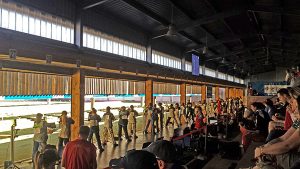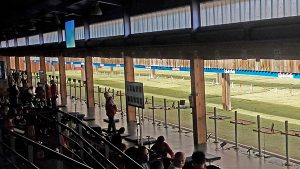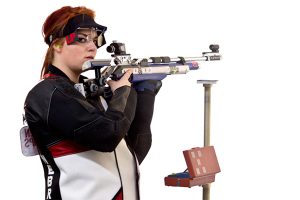Summer Camp Counselors Represent USA at ISSF World Championship in Spain
October 6, 2014
Civilian Marksmanship Program▸The First Shot▸Summer Camp Counselors Represent USA at ISSF World Championship in SpainBy Ashley Brugnone, CMP Writer
The Civilian Marksmanship Program (CMP) is proud to announce that five of its Summer Camp counselors earned slots on the World Championship team that competed in Granada, Spain, September 6-20 at the 51st International Shooting Sports Federation (ISSF) World Championship.
Sonya May, Dacotah Faught, Lorelie Stanfield, Tim Sherry and Lauren Phillips all demonstrated exceptional marksmanship to receive their places on the firing lines amongst some of the most elite marksmen in the world.
Back in June, counselors Lauren Phillips and Tim Sherry described their first taste of international shooting they experienced during their trip to the inaugural ISSF Junior World Cup in Suhl, Germany, May 26-June 1.
The competition assembled the most consistent performers from around the world, vying for a spot on their own respective World Championship teams. Members of the USA Shooting Junior air rifle, pistol, smallbore and shotgun teams all traveled to Europe to represent the United States during the match.
“My family was wigging out. Totally stoked!” Lauren said. “They were just happy that I was doing something Top Level. They were excited for me, definitely.”
“My family was the same way. My sister got mad though because she’s not the world traveler and I am now.” Tim said with a smile. “But they were super stoked to see me go there.”

Lauren, a sophomore at the University of Nebraska, and Tim, a junior at the University of Alaska Fairbanks, had seen each other at competitions before but had never officially met until at the airport for the flight to Germany.
“I knew ABOUT her, I’d seen her shoot, but we hadn’t really talked at all,” said Tim.
“I saw him in the airport and I was like, ‘That kid, yep, the one with the earrings and the hair,’” said Lauren with a laugh. “It was our bonding experience.”
Once into Germany, the two noticed the differences in the culture right away. From the small, compact layout of the towns to simple tasks like ordering a meal, Lauren and Tim soon realized they weren’t in the U.S. anymore.
Luckily for them and their stomachs, fellow teammate Elizabeth Gratz had been to Germany a handful of times in the past and was elected team translator by default during the trip.
“She knew how to order food, and we were all kind of like, thank goodness!” Lauren said jokingly.
Once they arrived at the competition, more changes brought further challenges to the surface.
“There was a lot of pressure there. I kind of wasn’t expecting that,” said Tim. “With championships we’ve done back in the U.S., there is pressure, but you knew everyone there and it was still kind of a comfortable environment. In Germany, everything was out of your element.”
Inside the range, the shooting organization itself forced the team to make some adjustments. Since the range officers didn’t speak English, Tim, Lauren and their teammates had to pay close attention in order to understand what was being said. Hand signals were useful a lot of the time, especially during equipment check and during competition.
“On the range it seemed a lot more competitive as well. I mean, obviously it was a Junior World Cup, but there were huge scores being put up. I didn’t expect scores to be that big for a junior competition,” said Tim.
His busy schedule the few weeks before the match resulted in a rocky start for Tim at the World Cup. Having had his wisdom teeth removed and little time for practice, the only event he felt prepared enough for was the three-position competition.
“In prone I struggled through the mindset of shooting decimal. I think it kind of got to me, and a little bit of the wind. Air rifle, I hadn’t trained enough, and it showed,” he said. “But I came back strong with 3P, which was the only thing I really felt confident in going into that match. I shot really well in the qualification with the exception of one or two shots, and in the final I did pretty well too.”

Lauren had a similar experience. After traveling to Fort Benning for training after she finished her year at college and a short stint at home for a few days before heading overseas, she started to feel as if she was living out of a suitcase, which she feels affected her performance.
“I think it caught up to me a little bit. I was kind of like, alright, just keep consistent here. Air gun, I feel I was pretty consistent. Not that I’m happy with that, but I wasn’t that terribly upset with it,” she said.
In smallbore she felt she struggled as well – down about 10 points from where she usually averages. With a little self-talk and a newfound confidence, she remembered the importance of making the best out of every situation.
“I was kind of like okay, take it in stride, it’s your first international match. It’s your first one, get this one out, and move onto the next one,” she added. “Overall, I wouldn’t say it was a failure at all. It was definitely a learning experience.”
The Junior World Cup combined teams from around the world, including young marksmen from Europe, Asia, South Africa, Australia and South America. Despite obvious language barriers, Tim and Lauren still did their best to interact with other competitors.
“It was cool. It was small talk for sure, just because there was such a gap between understanding them,” said Lauren.
“We talked a little bit to the Italians and some Serbians, but we talked a lot to the Australians and the British because we knew they spoke English,” Tim added.

With their first trip behind them, Tim and Lauren now have a better understanding of the cultural and competitive obstacles that can come along with international shooting. Now veterans, they offer wise words of advice to those who may share the experience in the future.
“Enjoy it. It was a huge learning experience. I don’t think anyone on that team shot the way they wanted to, at least not for rifle, but you’ve got to learn from certain things,” said Tim.
“Be sure to live the life overseas. Live in the culture,” Lauren suggested.
“Every time we were questioning whether or not we should buy something, we convinced ourselves to do it because we might never be there again,” said Tim.
“I got a really expensive stein because of that. And lots of chocolate and caramel waffles,” he added, with a laugh.
“You just kind of have to assimilate and enjoy it because the ones that tend to stay in, you’re just not getting the full experience and you’ll regret it,” Lauren said. “I think we had a really good time.”
In Spain, the USA Shooting Team collected 17 medals, two Olympic quotas, four World Champions and one Team Champion title. Over 2,000 athletes from 94 countries competed at the championship, which is held every four years. Special congratulations to Alex Chichkov, who received the gold medal in both Men’s Standard Pistol and Men’s Sport Pistol!